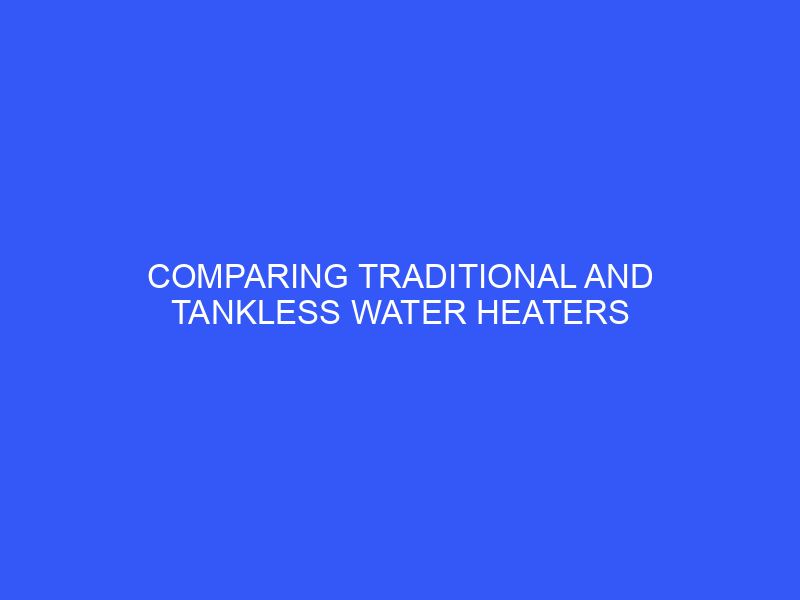Every home requires a water heater since they come up with hot water for bathing, laundry, and dishwashing. Tankless and traditional water heaters are choices that homeowners have. Each has exceptional characteristics and advantages, making it hard to conclude which is ideal for your home.
In this guide, we’ll explore the differences between tankless and conventional water heaters, highlight their pros and cons, and help you make an informed decision.
Traditional Water Heaters
Traditional water heaters are popular in many homes. They accompany a tank that stores and heats boiling water. The tank is insulated to guarantee that water stays hot when the heater isn’t used. Hot water is drawn from the tank, runs through the pipes, and finally is used at the taps. The capacities of tank-storage water heaters range from 20 to 100 gallons.
They are affordable and straightforward to install, making them an optimal choice for most property owners. They consume more energy than their tankless counterparts since they continuously warm water even when you are not utilizing it.
Furthermore, storage tank water heaters require more maintenance and have a more limited life expectancy than tankless systems.
Tankless water heaters, also known as on-demand water heaters, operate without a storage tank. Instead, they immediately heat the water through pipes when you turn on the hot water tap. They save energy since they heat water when required. They provide a consistent hot water supply and are environmentally friendly, so you won’t need to worry about running out of hot water.
Tankless water heaters are a brilliant decision for more modest homes since they are small and occupy less room than traditional heaters. Notwithstanding, installing a tankless heater can cost more than installing a conventional heater.
Comparing Traditional and Tankless Water Heaters
Installation
Most plumbers can complete the relatively easy task of installing a traditional water heater in a few hours. However, tankless water heaters require specialist installation, so you’ll need to hire a skilled installer who understands how to accomplish it. These specialized systems must be deployed correctly, which calls for expertise to guarantee their safe and effective operation.
Space Requirements
The space needed for installation for each will differ. A traditional tank water heater usually requires more space for building because of its storage tank. Conversely, tankless water heaters, which rely on a burner system to heat water through the unit, only need enough space to be mounted on a wall.
Therefore, tankless units might be your best option if you’re searching for a more space-efficient approach to heat the hot water in your home.
Energy Efficiency
To put energy efficiency into perspective, the continual reheating system of traditional water heaters usually results in higher energy consumption.
Conversely, tankless water heaters only heat water instantly when needed. As a result, there is an almost limitless supply of hot water, and fuel is used more effectively, saving up to 34% on energy overall.
System Lifespan
Tank water heaters will more often than not last between 8 to 12 years, while tankless water heaters typically have a 20 to 30-year life expectancy with legitimate consideration.
Pros And Cons Of Traditional Water Heaters
Pros:
- Reduced upfront costs: Installing a traditional water heater might be half that of a tankless one.
- Simple and affordable to replace: Less complicated installation equals fewer potential problems.
Cons:
- Increased utility costs: Regardless of water usage, they heat and reheat water at a predetermined temperature. Your utility expense will go up as a result, particularly in the winter.
- Larger and more challenging to position: They take up more space and cannot be placed outdoors.
- May run out of hot water: Have you ever been the last one to take a shower in your family? It’s a terrifying encounter. Buying a larger tank will help you avoid this issue, but the energy expenses will also increase.
- Its lifespan is shorter, typically around ten to fifteen years. Due to the higher replacement frequency, you’ll need to purchase them twice as often as tankless water heaters.
Pros And Cons Of Tankless Water Heaters
Pros:
- Long-term cost savings: Energy.gov states that demand(or tankless) water heaters can be 24%-34% more energy productive than conventional storage tank water heaters for homes utilizing 41 gallons or less of hot water each day.
- These are small, adaptable, and can be installed outside on a wall or other surface.
- Lives longer – Endures 20+ years. Practically twofold a conventional water heater’s life.
- Provides hot water when needed. It can convey up to three gallons of heated water each moment when required.
Cons:
- Higher initial outlay: Installation fees range from $2800 to $4500, depending on the type and merchant.
- Retrofitting results in higher upfront costs because it requires more labor to convert a traditional water heater to a tankless system; thus, the installation cost is further increased.
Which Water Heater Should I Choose?
Choose the water heater that fits your water usage, lifestyle, and budget demands.Energy.gov estimates you can save upto $100 annually with an Energy Star tankless water heater. Therefore, switching to tankless can save you money over time if you can afford the higher initial expenditures. Larger households can also benefit from tankless systems because they usually use more hot water.
However, a conventional water heater can make more sense if you’re on a limited budget and need a replacement immediately.
FAQ’S
Is a tankless water heater better?
In terms energy efficiency, the more recent tankless water heaters are superior. Tankless heaters heat only the water you need, which is far more efficient than heating a large amount of water that might never be utilized. Energy costs can be lowered by up to 30% compared to tank-storage water heaters.
Can you get a tax break for having a tankless water heater?
Previously, tankless water heaters that met the standards were eligible for a $300 tax credit. Researching before making a purchase is a brilliant idea if the tax credit is a primary motivator for you to transition to a tankless water heater, as it is subject to change annually.
How long do tankless water heaters last?
Water heaters without tanks can last up to twenty years.
How long do tank water heaters last?
The typical lifespan of a tank water heater is 10 to 15 years.


